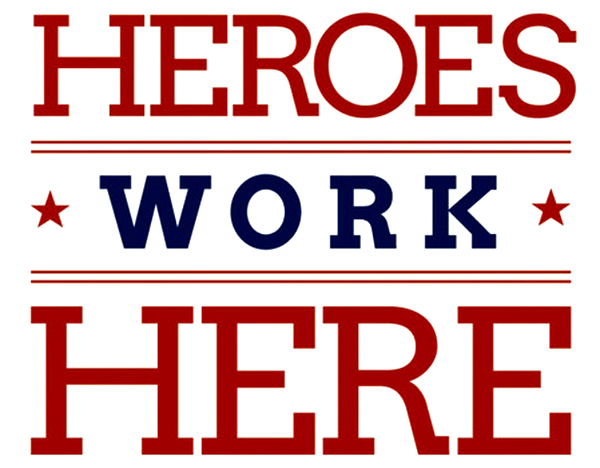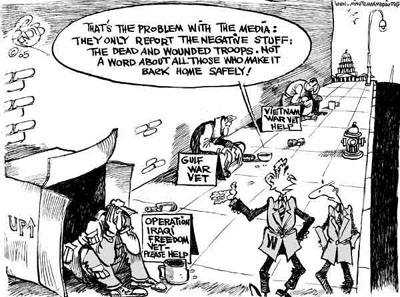More Than A Box of Candy
“If you’ve ever seen the look on somebody’s face the day they finally get a job…they look like they could fly.”
– President Dave’s Final Speech (Kevin Kline)
Dave, 1993
My wife and I don’t buy Girl Scout Cookies (Okay, many Girl Scout Cookies). We don’t buy Boy Scout Popcorn either (Partially because it’s so not cookies). We always buy a box or a bag and say “Send it to the troops.” This year, as a family we participated in “Operation Shoebox” and sent Halloween candy to the troops. The idea is simple; the troops are at war so they need our help, our support—just like the bumper sticker. But in my post-graduate study of Career Counseling, I’ve discovered that our troops who’ve returned from war need just as much help—maybe more—but are lacking the same attention and support from employers. Today, in my small corner of the net, I’m hoping to change that.
Less Than a Hero’s Welcome
“And its not about the paycheck, it’s about respect, it’s about looking in the mirror and knowing that you’ve done something valuable with your day.”
– President Dave’s Final Speech (Kevin Kline)
Dave, 1993
 We hear about our lousy economy every day; how hard it is to find work, how low paying the jobs that are out there have become. Regardless of how difficult this American Life is, it is still our American Life, and our troops abroad protect that life. But “veterans returning from war zones are now battling for their financial lives here at home,” according to Captain James Key.
We hear about our lousy economy every day; how hard it is to find work, how low paying the jobs that are out there have become. Regardless of how difficult this American Life is, it is still our American Life, and our troops abroad protect that life. But “veterans returning from war zones are now battling for their financial lives here at home,” according to Captain James Key.
The Wall Street Journal published a study which found that “young veterans are earning less and having more difficulty finding work than their civilian peers…and this study was done before the last economic crisis.” Partially because some employers “fret about [veterans’] mental health or skill set,” wrote Key (2008).
There are even instances where those in part time service have been fired from the jobs they did have because of their service, such as an Arizona National Guardsman who was “removed from his position as a department supervisor” of Home Depot after managers “openly expressed their displeasure with his periodic absences due to his military obligations” (Lin, 2012)
This Monday is Veteran’s Day, and that’s not usually a big deal in our house, which is again something I’m confessing to you with the belief that our home is in the majority. I had left the military and military service for something that I saw on CNN and had ashamedly assumed that post-deployment employment was something handled by some government agency and the GI bill. When I found that I was in error, I was surprised that I felt a sense of betrayal on behalf of the soldier who returns home after facing death to uphold the American Dream and doesn’t find that dream waiting. Instead, he or she finds more fierce competition to live, but now against their fellow Americans for too few jobs—and worst, being hamstrung in their fight because the years of training for that same armed service has left them state-side with too few marketable skills.
The Mission Briefing
“And if one person could start to feel this way [employable; valuable] and then another person, and then another person, soon all these other problems may not seem so impossible.”
– President Dave’s Final Speech (Kevin Kline)
Dave, 1993
The need for jobs isn’t just a problem for vets. Both military and civilian job seekers are essentially answering the same three career questions “Where are you now? Where do you want to go? And what are the steps that will get you there?” (Brooks, 2009) However, there are unique challenges to the military job seeker. As Captain Key mentioned, there could be mental health challenges like PTSD, other anxiety or adjustment disorders or depression. There could be challenges in updated a skill set or finishing a career path that began prior to the military. Was there an injury? There could be a legal or ethical situation like the fired National Guardsman—because what Home Depot did is quite illegal—that can underscore feelings of betrayal by a past employer, the government or civilian society.
Facing these challenges, the idea that vets don’t have marketable skills is a wrong perspective—and turning military service experience into marketable experience requires just that; a change in perspective.
Dr. Katherine Brooks (2009) encourages a narrative approach to presenting your military service as a job strength. “Focus on positive stories which explain what you learned, how you solved problems, how you were a leader—regardless of rank,” she said. “So, instead of talking to your potential employer about sharp-shooting specifically, indicate that you carried out duties that required you to have a strong attention to detail…”
I believe this perspective shift is key to a personal re-examination of a veteran’s tour that can only help the transition to civilian life, which has been noted in the research to be difficult for all our returning military. Often there’s life before deployment, then deployment then life after deployment. While common, it’s also a fractured view a person’s life and value that can lead to a fractured view of self. Growing to see yourself a one whole integrated person will not only make you more marketable, it will help you heal, as this before-during-after fracture is also a common theme in overcoming grief, trauma, loss and any major life change.
A Nation of Heroes
“You don’t really know how much you can do until
you stand up and decide to try.”
– President Dave’s Final Speech (Kevin Kline)
Dave, 1993
 Today, in the dawn of Veterans’ Day, as Operation Shoebox flies Halloween candy into war zones, in the month of Thanksgiving, we spent some time looking at the employment plight of our nation’s protectors. But I don’t want to overlook the equally important plight of all unemployed Americans especially entering the Holidays. As Captain Key (2008) put it, “a nation is only as strong as its weakest citizen,” and being unemployed can make anyone feel weak, plus it weakens our nation. The narrative concept outlined above can also be applied to building a marketable perspective on a layoff, on months of stay-at-home parenthood due to unemployment, of any life change. Take the situation, identify the struggles, realize and praise yourself for still sticking with it, staying alive, providing for your loved ones and staying in the job hunt—then figure out what you’ve learned or built in doing all that. Open your eyes to how you are a Hero to someone, too, and you will begin to see your value and what you have to offer any employer.
Today, in the dawn of Veterans’ Day, as Operation Shoebox flies Halloween candy into war zones, in the month of Thanksgiving, we spent some time looking at the employment plight of our nation’s protectors. But I don’t want to overlook the equally important plight of all unemployed Americans especially entering the Holidays. As Captain Key (2008) put it, “a nation is only as strong as its weakest citizen,” and being unemployed can make anyone feel weak, plus it weakens our nation. The narrative concept outlined above can also be applied to building a marketable perspective on a layoff, on months of stay-at-home parenthood due to unemployment, of any life change. Take the situation, identify the struggles, realize and praise yourself for still sticking with it, staying alive, providing for your loved ones and staying in the job hunt—then figure out what you’ve learned or built in doing all that. Open your eyes to how you are a Hero to someone, too, and you will begin to see your value and what you have to offer any employer.
To do my small part I’ve added a few links to the Helplinks page under “Military Service” for our veterans. Please click them if you’ve read this and are seeking help or hope with a job or any aspect of resumed life. It’s most often free and our chance to serve you. As always I encourage anyone who needs help or an ear—vet or not—to email me or use the contact page.
Most of all, no matter if you are employed, unemployed or employer, what struck me the most is that our military has returned from fighting our enemies to a battle-ground at home where we fight each other. I’ll take a page from Dave’s world view because it’s a great 90’s movie and has a great, if Hollywood message about jobs, and encourage everyone to continue the healthy job competition but with a comrade’s spirit. There may not be enough jobs for everyone, but there’s plenty of dignity to go around, we just need to share it.
__________________________________________________
Brooks, K. (2009). Career Transitions: Job Searching Tips for Veterans. Psychology Today. Retrieved from: http://www.psychologytoday.com/blog/career-transitions/200905/job-searching-tips-for-veterans
Key, J. (2008). Young Veterans Face Financial Battles. USA Today. pp. 11A. Retrieved from: http://www.capveterans.com/american_veterans/
Lin, H. (2012). Vet Employment Issues at Home Depot. Military.com. Retrieved from: http://jobsforveterans.military.com/649/vet-employment-issues-at-home-depot/



